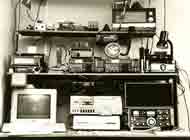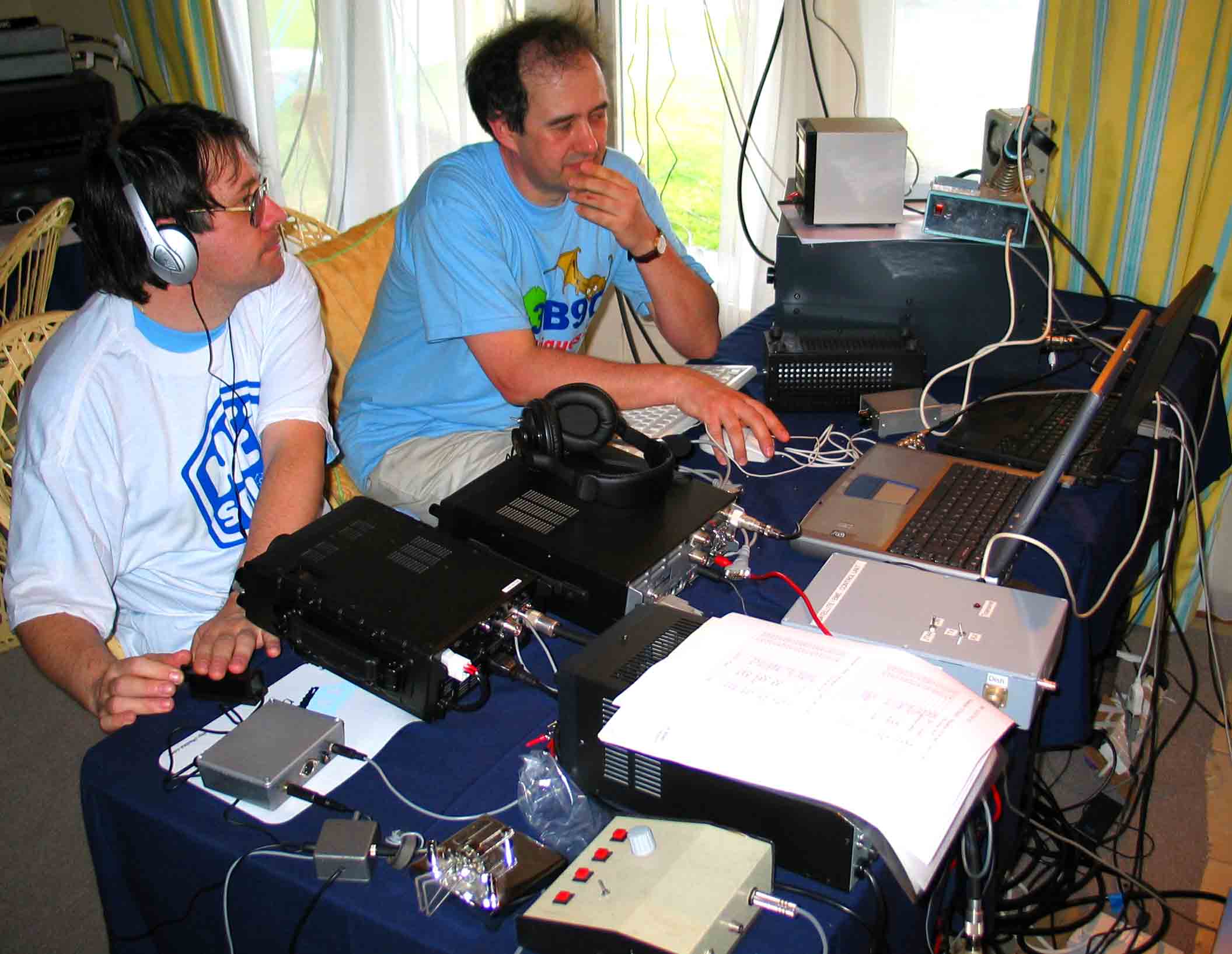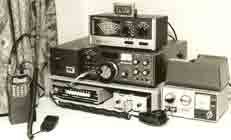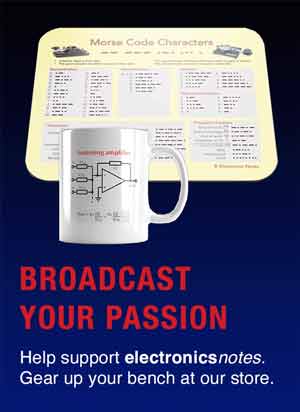What is Amateur Radio? Ham Radio
- a summary or overview of the fascinating hobby of amateur radio or ham radio.
Amateur radio is one of the most exciting hobbies today. There are over a million radio amateurs or "radio hams" around the world and this is an indication of its popularity. Since the first amateur radio experimenters at the beginning of the twentieth century, the number of people interested in the hobby have grown.
... a typical amateur radio shack may include a variety of equipment....

Even with the arrival of mobile phones, international telecommunications and the Internet, amateur radio is still very popular and it attracts many new members each year.
Aspects of amateur radio
One of the great advantages of ham radio is that there is plenty that is plenty to do within the hobby. Some radio hams are interested in one aspect, whereas other will have other interests within the hobby. In fact it is possible to take an interest in these different elements of the hobby so that it is able to become a life long interest that never looses its appeal.- HF operating and DXing: Many radio amateurs enjoy talking to "DX" stations at all corners of the globe. It is possible to talk to other radio hams on the other side of the globe, or possibly on a small island in the middle of an ocean, or just a radio amateur from the other side of town. All this can be done from your armchair. Even in today's high technology world there is a great fascination about being able to communicate with other radio hams oer the air using no other equipment apart between the two stations.

... radio amateurs may visit rare and distant countries and islands to operate from....
Image courtesy FSDXA
- VHF / UHF and microwaves: While the short wave bands are the most well know bands for radio amateurs, there is plenty of activity and interest on higher frequencies. There are amateur radio frequency allocations right into the microwave region and all of these allocations give a huge amount of scope for the hobby. Many of the VHF and UHF bands provide an excellent medium for local communications, many radio hams operating "mobile" from their cars. There is also a network of repeaters in many countries enabling contacts to be made over greater distances and by stations in poor locations.
- Ham radio friends: One of the great aspects of amateur radio is the number of good friends it is possible to make. Not only can one talk to them over the air, but there are many occasions for meeting each other. Local clubs and ham radio rallies and "hamfests" are great places to meet and talk. Even if amateur radio friends are in another country, it is not unknown for them to meet. Sometimes friendships have been built up over the air, and the radio hams have stayed with each other or met at an international ham radio meeting.
- Computers and data communications: Other radio amateurs enjoy linking their computers to their amateur radio gear. There are many ways in which computers can be linked to amateur radio gear. They can be used to perform many tasks such as predicting the propagation conditions, or logging the stations that have been contacted. However they can form an integral part of the ham radio station for use with the many data modes that are available nowadays. Using the computer as the controller and interface it is possible to send messages via a network of "mailboxes" to be picked up by the recipient when he next logs in.
- Construction: Some radio amateurs enjoy the challenge of constructing their own equipment. Although much of today's amateur radio equipment can be very technically advanced there is still a major place in the hobby for home construction. There is a variety of ham radio kits on the market that can be built, or a circuit might be put together from a circuit in one of the many magazines that cater for the hobby. There is an enormous feeling of achievement when the first contact is made on equipment you have built yourself.
- Antennas: There are other areas where the radio amateur can experiment. Often radio hams enjoy trying out new forms of antenna. As the performance of the antenna governs the performance of the whole station, even small improvements in the performance of the antenna can pay great dividends, and again the topic of antennas is of interest to many.
- Scientific studies: There have been many instances where radio amateurs have made valuable contributions to scientific studies. One area where this has been particularly true is in the field of radio propagation. The large numbers of radio amateurs on the air have meant that large amounts of data can be collected for the various phenomena associated with propagation. This has been invaluable in many areas of scientific studies. In addition to this, knowledge and experience in areas such as data transmission has been used in developing commercial systems that have incorporated many of the lessons learnt from the experience of radio hams.
- Emergency communications: Amateur radio is often used for the benefit of society. Radio hams often provide emergency communications support to the rescue and other essential services after a disaster. On several occasions amateur radio has provided the only form of communications to and from a storm hit island. Even where such major disasters are not quite so catastrophic, radio mateurs train and offer their equipment and unique expertise for when it might be needed.
- More . .: While it is possible to give details of many fascinating areas of amateur radio, it is not possible to itemise every interest. As one finds out more about amateur radio, new areas of the hobby may open up, providing many new interests.
Amateur radio can also lead into an interesting and rewarding career. Many people who have started in amateur radio when they are young have gone on to successful careers in radio or electronics. The blend of experimentation and challenges the hobby offers mean that many employers look for radio amateurs in preference to other candidates. This is particularly true with the booming growth in the cellular telephone industry where radio frequency skills are at a premium.
Amateur radio is a hobby for anyone, and it can be a fascinating pastime - a hobby for life as there are many aspects to it.
Amateur radio license
Before being able to transmit it is necessary to possess an amateur radio transmitting license. The reason for this is that radio amateurs are given a considerable degree of freedom to experiment, use equipment, and build their own equipment. In view of this it is necessary that radio amateurs have sufficient knowledge about radio and electronics so that they do not cause interference to others. Each country has slightly different conditions, but with the changing regulations world-wide many requirements are being reduced and greater levels of freedom given. In many countries now there is no need for the radio amateur to pass a Morse test.
A ham radio license provides an enormous amount of flexibility for ham radio operating and experimentation. However there are a few things it does not allow. It is not possible to use the license to set up a broadcast station. It is intended for communicating with other radio hams, and in any case thee would also be issues with copyright licensing. Additionally the license does not permit communication with stations apart from amateur radio stations - particularly pirate or unlicensed stations.
A ham shack
When setting up an amateur radio station it will be necessary to set aside some room for the equipment. Dating back from the early days of radio, a ships radio room or an amateur radio station is called a radio shack and the term has remained.
A typical amateur radio shack may include a variety of equipment including transmitters, receivers, and a number of ancillary items. Some shacks may be small and they can be neat, containing a small amount of equipment so that they can fit in a cupboard or in the corner of a room. Other people may want to set aside a room for the equipment.
... an amateur radio shack can be neat and contain a small amount of equipment....

With a little thought and ingenuity, it is possible to make many areas of the house into an excellent ham radio shack. Even garden sheds have been successfully used. Wherever the amateur radio shack is located, it is worth remembering a few points:
- There must be adequate provision for mains power
- There must be suitable access for the antenna feeders
- It should not get too cold in winder or too hot in summer
- Particularly if the amateur radio shack is located outside the main house, there should be sufficient security to prevent any equipment being stolen
- It must be easy and convenient to operate the station in its location - some stations located in a small corner of a room may be difficult to use.
By thinking through these and any other relevant points, it is possible to choose a convenient location for the amateur radio shack, and plan for it to be easy to operate the equipment from. In this way the hobby of amateur radio can provide the maximum please and enjoyment.
Summary
Ham radio is a fascinating hobby for many people. Since the hobby was first started back around 1998, many millions of people have been captivated by it and many millions of amateur radio licenses have been issued. Despite the rapid development in radio and electronics technology that have been made in recent years, the hobby of amateur radio is still as strong as ever and many people are entering the hobby of amateur radio. With this being the case, it will continue to be a major interest for many people for years into the future.
 Written by Ian Poole .
Written by Ian Poole .
Experienced electronics engineer and author.
More Ham Radio Topics:
What is ham radio
Callsigns
Morse code
Voice modes
Digital data modes
QRP operating
Operating awards
Codes & abbreviations
Ham bands overview
Operating via differnet propagation modes
Repeaters
Callsigns
Contact formats
Setting up a shack & buying equipment
Return to Ham radio menu . . .




